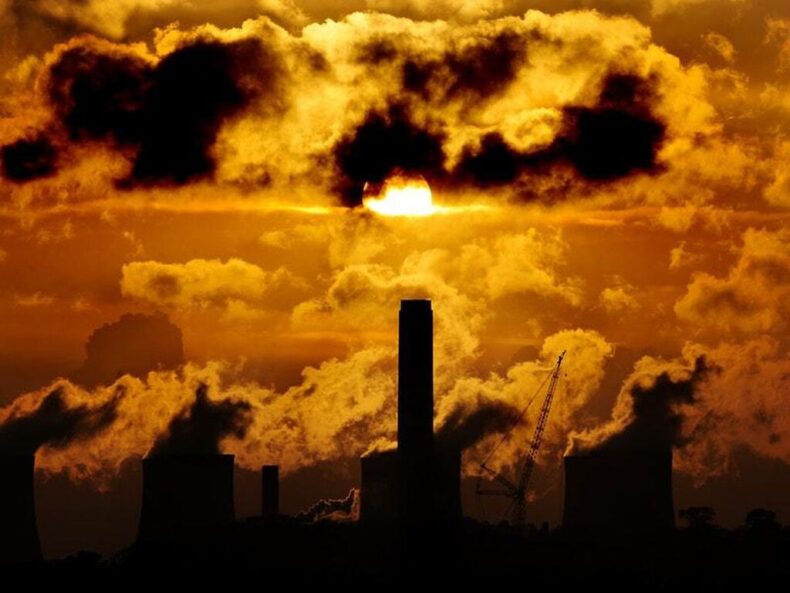By : Sanat Sari Saren
Industrial and agricultural emissions constitute about 47% of global green house gas emissions every year.
Photo Source – The Guardian
Increasing Global Temperatures
According to a new Meteorological Office study, the scope of the average global temperature crossing above 1.5° C from pre-industrial levels in one of the next five years is now about 50:50 (48%) and one of the next five years may be the warmest on record of Human History.
The Global Annual to Decadal Climate Update, made by the World Meteorological Organization, additionally showed a 93% chance that the five-year average annual global temperature for 2022-2026 will be higher than the average for the last five years (2017-2021).

photo source : National Geographic
According to Dr. Leon Hermanson from the MET office, who presented the report, the latest climate predictions show that the annual global temperature rise will continue,
with an even chance that one of the years between 2022 and 2026 will have global temperature exceeding the set 1.5°C target set during the Paris accord’s.
He also added that a single year of exceeding global temperatures above 1.5° C does not necessarily mean that humans have breached the iconic threshold of the Paris Agreement.
But it does confirm the worrisome notion that we are edging dangerously close to a situation where 1.5° C target may be exceeded for an extended period of time.
World Meteorological Office issues temperature warnings
Recently WMO has issued a stark warning that the chance of annual global temperature rise of 1.5° C above pre-industrial levels has risen steadily from 10% during 2017-2021 to nearly 50% within the following five years.
According to the provisional WMO report on the State of the Global Climate, In 2021 the global average temperature was 1.1° C above the pre-industrial baseline.
If conditions keep worsening then in the years between 2022-2026, one year at least will have global temperature exceeding 1.5° C mark, warmest on record since 2016.

Photo source: Reuters
The increasing number of climatic extremities experienced worldwide since the beginning of 2022, confirms the findings of scientists and experts.
The global climate is becoming more and more hostile with every passing year, be it forest fires in south Africa or the recent heat waves experienced by India and Pakistan or the Flooding in the Philippines, human activitie’s effect on the changing climate conditions is now clear as day.
According to sources, MET department’s final report will be released on 18 May.
In the meantime, back-to-back La Niña events at the beginning and end of 2021 had a cooling effect on global temperatures, but environmental scientists have confirmed that this condition was only temporary and will not reverse the long-term global warming trend.

Photo source: The Guardian
Any development of an El Niño event would immediately fuel temperatures, as it did previously in the year 2016, which is currently the warmest year on record in recent human history.
Professor Steven Sherwood, an ARC Laureate Fellow at the ARC Centre for Climate System Science and UNSW Climate Change Research Centre said
the report is looking at year-on-year natural variations in global-mean temperatures and the chance’s that within the near future a single warm year might pop above the Paris accord’s global warming threshold, is now a significant and worrisome possibility.
A single year with global temperatures warmest on record since the pre-industrial times will mark the threshold when the climatic extremities will be potentially harmful for human lives and activities.
Conclusion
Although this doesn’t spell immediate danger but in the long term it is a worrisome possibility.
As a single year with global temperatures crossing 1.5°C, is less threatening in comparison to a regular trend of annual global temperatures crossing 1.5°C every year.

Photo Source: Reuters
As scientists produce more and more worrisome data about the global weather conditions,
experts are worried about the stark difference between the speed at which the condition of the blue planet is deteriorating and the speed at which we are mobilizing to cope with the climatic extremities.
If global warming continues unchecked then we will soon reach the tip off point.
And no amount of human effort will be able to save or restore the planet to its previous glory.
Edited by : Sanat Sari Saren
Published by : Sanat Sari Saren












